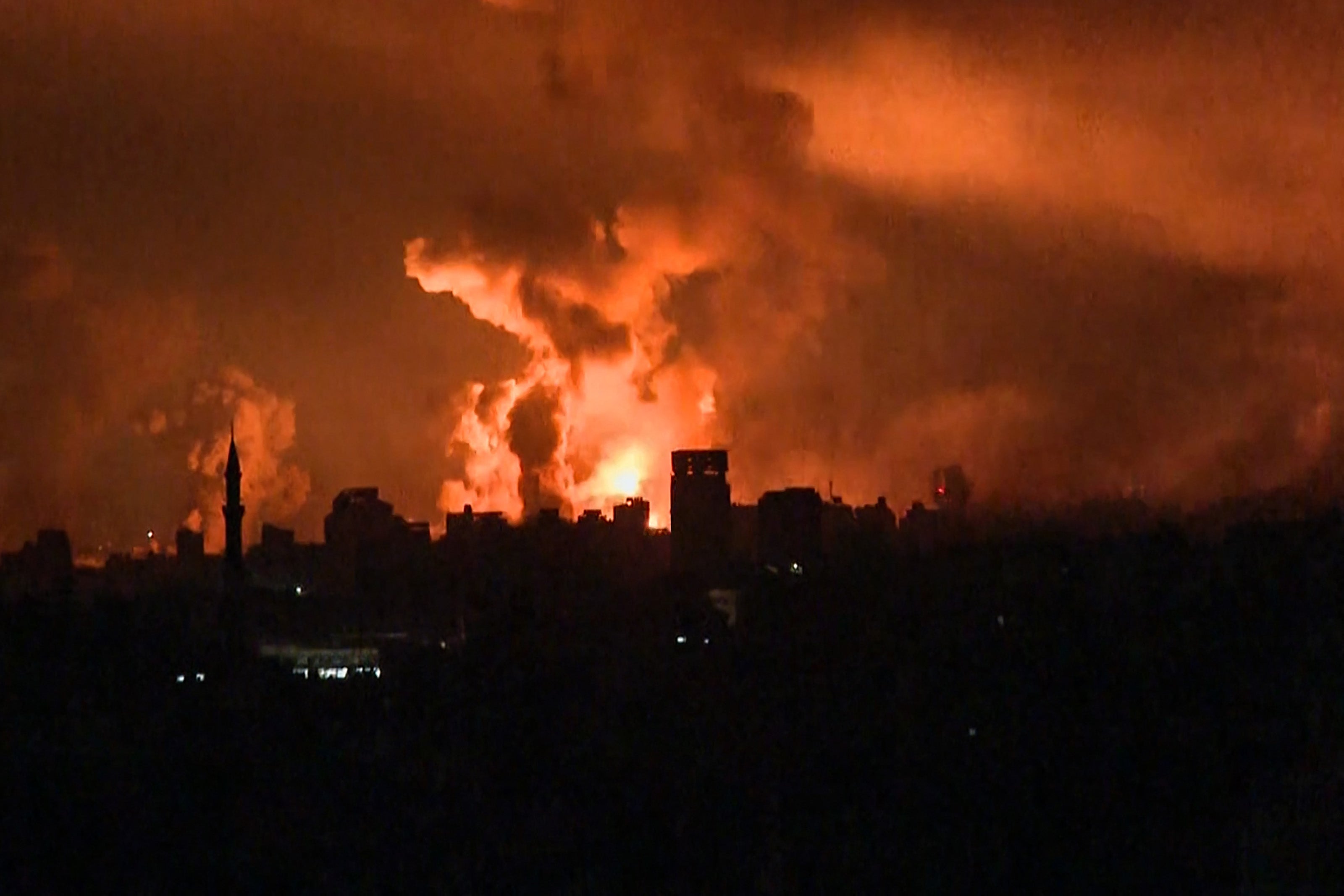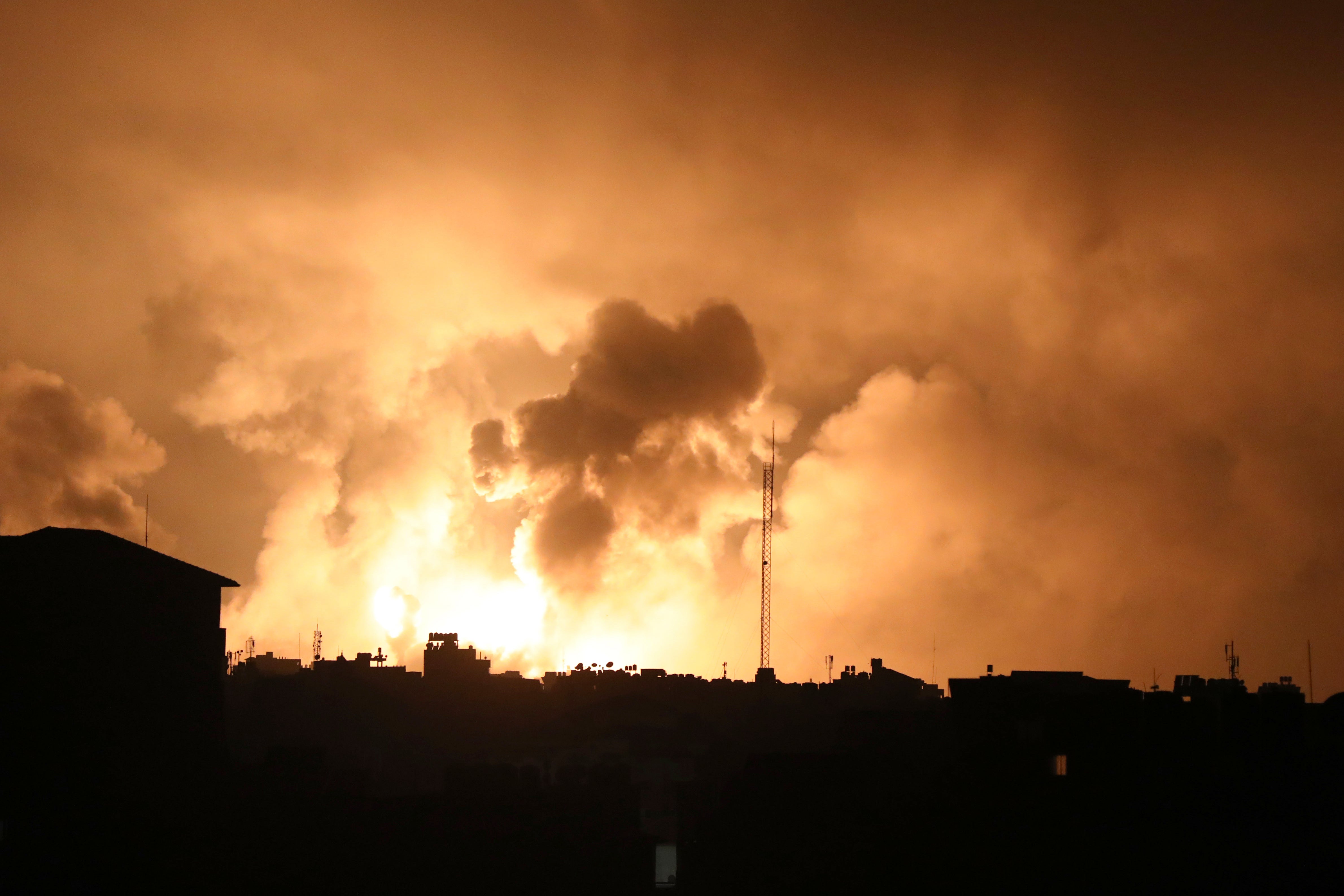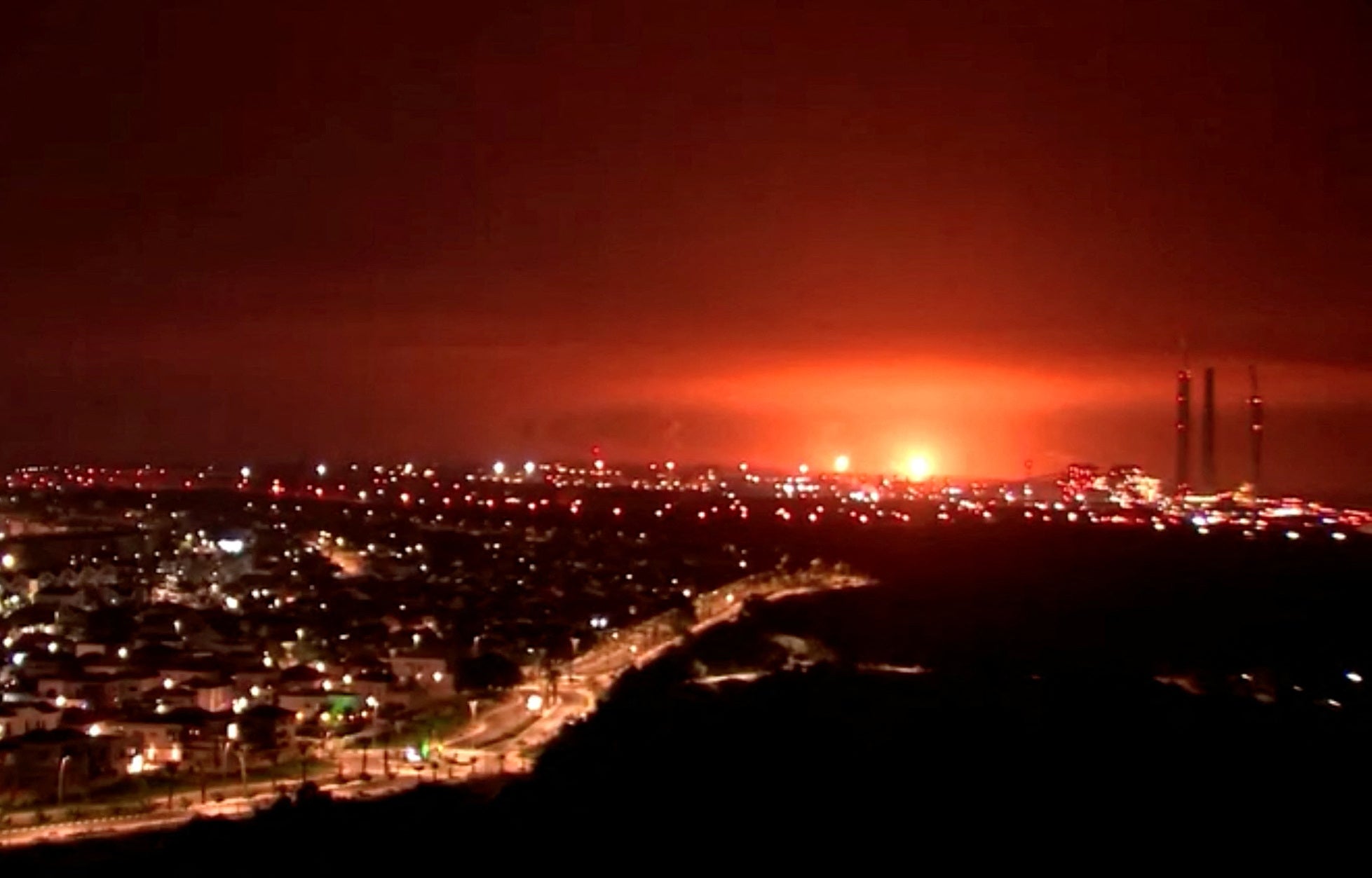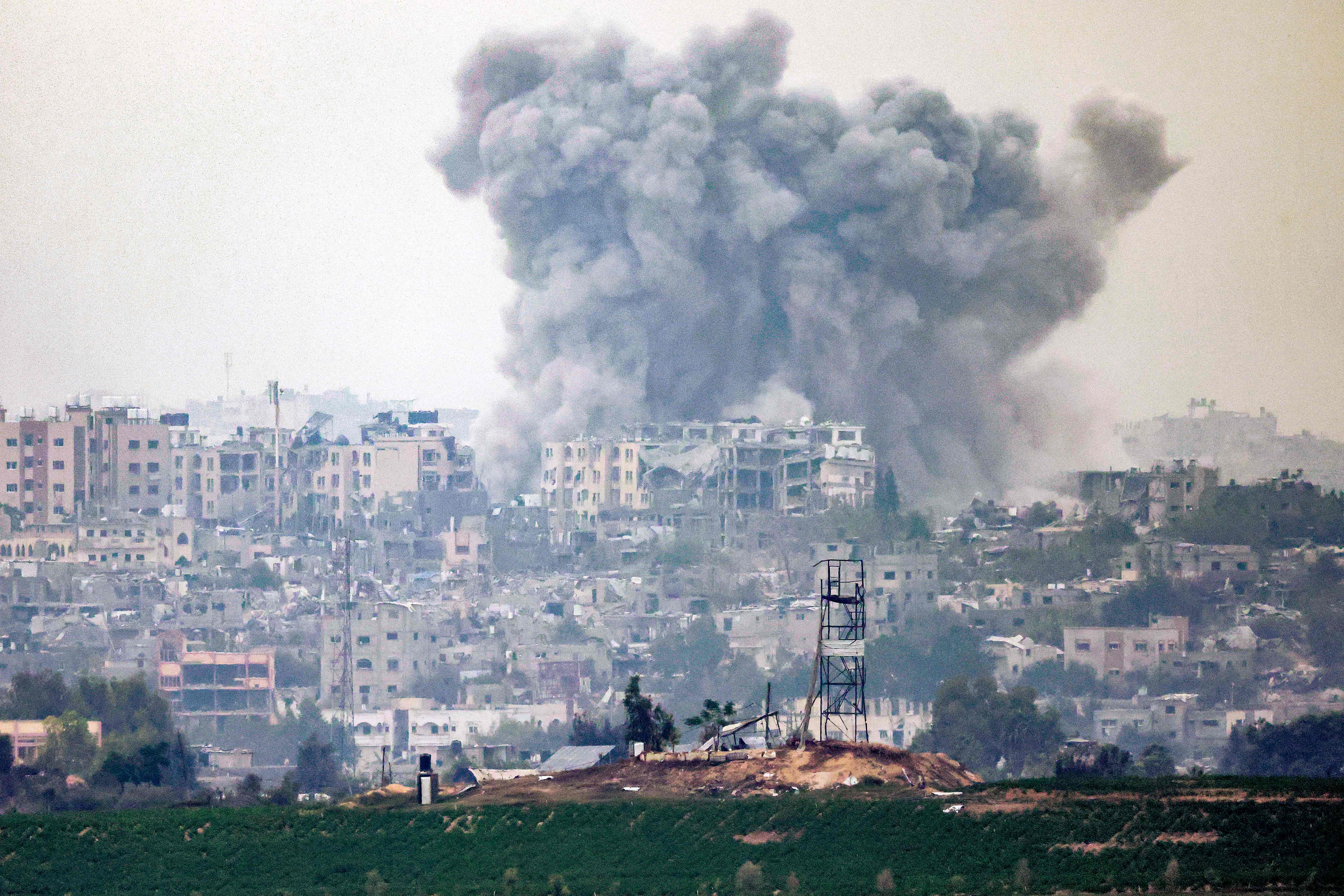Israel ground operations ‘expanding’ in Gaza with heavy bombardment and communications cut off
Orange explosions seen above northern Gaza as Israeli air force unleashes most devastating attack yet on the besieged enclave
Your support helps us to tell the story
From reproductive rights to climate change to Big Tech, The Independent is on the ground when the story is developing. Whether it's investigating the financials of Elon Musk's pro-Trump PAC or producing our latest documentary, 'The A Word', which shines a light on the American women fighting for reproductive rights, we know how important it is to parse out the facts from the messaging.
At such a critical moment in US history, we need reporters on the ground. Your donation allows us to keep sending journalists to speak to both sides of the story.
The Independent is trusted by Americans across the entire political spectrum. And unlike many other quality news outlets, we choose not to lock Americans out of our reporting and analysis with paywalls. We believe quality journalism should be available to everyone, paid for by those who can afford it.
Your support makes all the difference.Israel’s military announced on Friday evening that it is “expanding” ground operations in Gaza, amid reports of the heaviest bombardment yet of the besieged strip and a total communications blackout.
Orange explosions seared through the night sky above northern Gaza as the Israeli air force appeared to unleash its most devastating attack yet on the enclave, which is home to more than 2 million people.
While booms sounded as far as Egyptian towns in the Sinai, there was a chilling silence from within the 42km-long strip.
International rights groups, news agencies and families said they had lost contact with colleagues and loved ones as Palestinian network Jawwal and global monitoring group Netblocks reported services including phone and internet had been cut. The Palestinian Red Crescent, the main emergency service in Gaza, said it was cut off from its operations room because of the internet blackout.

Army spokesperson Rear Admiral Daniel Hagari confirmed the Israeli military had launched “intensified” strikes on the besieged strip.
“In addition to the [ground] attacks carried out in the last few days, ground forces are expanding their operations tonight,” he said, igniting fears that Israel had launched its widely-anticipated ground offensive. “In the last hours, we intensified the attacks in Gaza.”
Sources in the Israeli government told The Independent earlier in the day that Israel planned to step up its ground attacks in the enclave within 24 hours.
However, they said the plan may not reflect previous full ground incursions but model ground raids deployed in the early 2000s in the occupied West Bank during the second intifada.

Earlier, the country’s defence minister said Israel expects to launch a long and difficult ground offensive into Gaza soon to destroy Hamas.
Yoav Gallant described a campaign that will require dismantling a vast network of tunnels used by the territory’s militant rulers. Mr Gallant said the ground invasion that follows weeks of airstrikes “will take a long time”, and that it would lead to another lengthy phase of lower-intensity fighting as Israel destroys “pockets of resistance”.
It comes amid reports the US has piled pressure on Israel to hold off on a full ground invasion, fearing it might trigger a region-wide war as strikes from Lebanon and Syria to Israel, and attacks on US troops in the region, have increased.
Israel has called up hundreds of thousands of reservists, while launching its most intense campaign of aerial bombardment in retaliation for the deadly 7 October attack. Hamas militants stormed villages, towns and communities in southern Israel slaughtering hundreds of people and taking dozens, including British citizens, hostage.
Israel’s military vowed an “unprecedented response to an unprecedented attack” and imposed a crippling siege, which UN experts say amounts to collective punishment and so is a violation of international law.
Food, water, fuel and medical supplies are running out, and doctors have told The Independent they are having to improvise.

The health ministry of Gaza said that more than 7,000 people have been killed including more than 2,700 children – releasing a full list of the names, ages and ID numbers of each fatality. There are concerns that the death toll will soar if a ground incursion goes ahead.
More than 1,400 people were slain in Israel on 7 October, according to the Israeli government, and at least 229 hostages were taken into Gaza.
The overall number of deaths far exceeds the combined toll of all four previous wars between Israel and Hamas, estimated at around 4,000.
The United Nations once again issued a desperate plea for a ceasefire on Friday saying that they will be forced to halt their humanitarian support if fuel is not allowed into the strip and a ceasefire not imposed.
Officials from UNRWA, the UN’s Palestinian refugee agency, told The Independent that 54 staffers had been killed in the bombardment of Gaza, and that their surviving teams on the ground were having to make “impossible” choices between supporting hospitals, bakeries or water sources.

Doctors in Gaza said they were using washing-up liquid and vinegar to clean wounds and were rationing anaesthetic as medical supplies were running out.
Medhat Abbas, the director of Gaza’s largest hospital al-Shifa, said they were at 150 per cent capacity, sheltering tens of thousands of displaced people, running out of fuel to run their ventilators and surgical wards, and running on less than 40 per cent staff as so many medics had been killed, injured, or displaced.
Philippe Lazzarini, the head of UNRWA, said: “The siege means that food, water and fuel – basic commodities – are being used to collectively punish more than 2 million people, among them, a majority of children and women.”
About 1.4 million of Gaza’s 2.3 million residents have already fled their homes, with nearly half of them crowding into UN shelters.
But hundreds of thousands remain in northern Gaza, despite Israel ordering them to evacuate to the south and saying that those who remain might be considered “accomplices” of Hamas.
Join our commenting forum
Join thought-provoking conversations, follow other Independent readers and see their replies
Comments